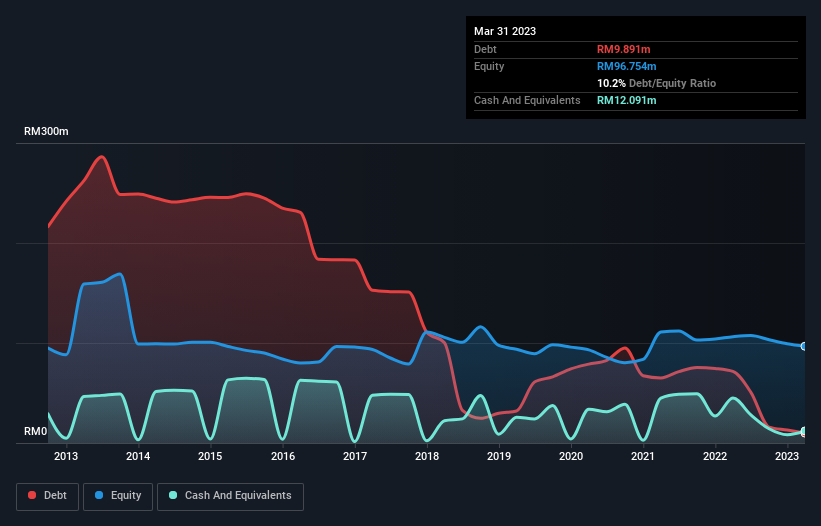Is Sinmah Capital Berhad (KLSE:SMCAP) Using Debt In A Risky Way?

David Iben put it well when he said, 'Volatility is not a risk we care about. What we care about is avoiding the permanent loss of capital.' It's only natural to consider a company's balance sheet when you examine how risky it is, since debt is often involved when a business collapses. Importantly, Sinmah Capital Berhad (KLSE:SMCAP) does carry debt. But is this debt a concern to shareholders?
Why Does Debt Bring Risk?
Debt assists a business until the business has trouble paying it off, either with new capital or with free cash flow. In the worst case scenario, a company can go bankrupt if it cannot pay its creditors. While that is not too common, we often do see indebted companies permanently diluting shareholders because lenders force them to raise capital at a distressed price. Of course, plenty of companies use debt to fund growth, without any negative consequences. The first thing to do when considering how much debt a business uses is to look at its cash and debt together.
View our latest analysis for Sinmah Capital Berhad
How Much Debt Does Sinmah Capital Berhad Carry?
The image below, which you can click on for greater detail, shows that Sinmah Capital Berhad had debt of RM9.89m at the end of March 2023, a reduction from RM71.6m over a year. However, its balance sheet shows it holds RM12.1m in cash, so it actually has RM2.20m net cash.

How Strong Is Sinmah Capital Berhad's Balance Sheet?
The latest balance sheet data shows that Sinmah Capital Berhad had liabilities of RM13.9m due within a year, and liabilities of RM6.46m falling due after that. On the other hand, it had cash of RM12.1m and RM22.2m worth of receivables due within a year. So it can boast RM13.9m more liquid assets than total liabilities.
This surplus suggests that Sinmah Capital Berhad is using debt in a way that is appears to be both safe and conservative. Due to its strong net asset position, it is not likely to face issues with its lenders. Succinctly put, Sinmah Capital Berhad boasts net cash, so it's fair to say it does not have a heavy debt load! There's no doubt that we learn most about debt from the balance sheet. But you can't view debt in total isolation; since Sinmah Capital Berhad will need earnings to service that debt. So when considering debt, it's definitely worth looking at the earnings trend. Click here for an interactive snapshot.
Over 12 months, Sinmah Capital Berhad made a loss at the EBIT level, and saw its revenue drop to RM55m, which is a fall of 60%. To be frank that doesn't bode well.
So How Risky Is Sinmah Capital Berhad?
While Sinmah Capital Berhad lost money on an earnings before interest and tax (EBIT) level, it actually generated positive free cash flow RM2.5m. So although it is loss-making, it doesn't seem to have too much near-term balance sheet risk, keeping in mind the net cash. We'll feel more comfortable with the stock once EBIT is positive, given the lacklustre revenue growth. When analysing debt levels, the balance sheet is the obvious place to start. However, not all investment risk resides within the balance sheet - far from it. For example Sinmah Capital Berhad has 3 warning signs (and 1 which can't be ignored) we think you should know about.
If you're interested in investing in businesses that can grow profits without the burden of debt, then check out this free list of growing businesses that have net cash on the balance sheet.
New: Manage All Your Stock Portfolios in One Place
We've created the ultimate portfolio companion for stock investors, and it's free.
• Connect an unlimited number of Portfolios and see your total in one currency
• Be alerted to new Warning Signs or Risks via email or mobile
• Track the Fair Value of your stocks
Have feedback on this article? Concerned about the content? Get in touch with us directly. Alternatively, email editorial-team (at) simplywallst.com.
This article by Simply Wall St is general in nature. We provide commentary based on historical data and analyst forecasts only using an unbiased methodology and our articles are not intended to be financial advice. It does not constitute a recommendation to buy or sell any stock, and does not take account of your objectives, or your financial situation. We aim to bring you long-term focused analysis driven by fundamental data. Note that our analysis may not factor in the latest price-sensitive company announcements or qualitative material. Simply Wall St has no position in any stocks mentioned.
About KLSE:SMCAP
Sinmah Capital Berhad
An investment holding company, engages in the property development business in Malaysia.
Flawless balance sheet slight.
Market Insights
Community Narratives


